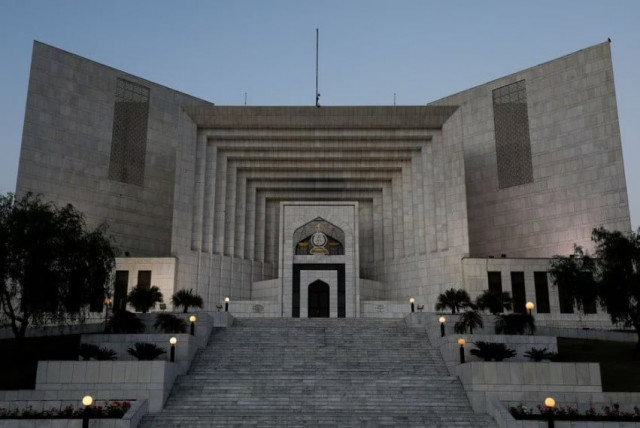SC must not forget Reko Diq lesson: Justice Afridi
Judge notes top court should never repeat riding on ‘unruly horse’ of ‘public policy’

Supreme Court’s Justice Yahya Afridi has noted that the lesson learnt from the Reko Diq case must not be forgotten and such kind of judicial adventure of riding on the “unruly horse” of “public policy” must not be repeated by the apex court and that too in its advisory jurisdiction under Article 186 of the Constitution.
“Hence, [I abstain from] answering the said part of Question No 1,” read Justice Afridi’s eight-page detailed opinion.
In July 2019, the International Centre for Settlement of Investment Disputes (ICSID) announced a massive $5.976billion (Rs944.21 billion) award against Pakistan in the Reko Diq mining project-- yet another instance where the verdicts of the former top judge Iftikhar Muhammad Chaudhry had cost the country dearly.
Chief Justice of Pakistan Umar Ata Bandial announced the 13-page short order after a five-judge larger bench of the apex court reserved its decision on November 29, 2022 in the presidential reference on the matter.
Read Imran, Qureshi's judicial remand extended till Sept 26 in cypher case
The settlement agreement was signed in March last year and the presidential reference sought the SC’s opinion on whether or not its 2013 verdict prevented the Centre and provincial governments from entering into the implementation pact again.
However, one member of the bench, Justice Afridi, did not respond to the first question wherein it was asked as whether or not the public policy or Constitution prevented the Centre as well as the Balochistan government from entering into implementation and definitive agreements.
"The judicial intrusion of this court in the Maulvi Abdul Haq Baloch case, with all the humility at my command and with utmost respect to my learned brothers, when viewed in retrospect, appears to be a rushed decision where there was no 'live issue' left for determination,” the judge pointed out.
“The very issuance of a mining licence, which was the subject matter of the petition before the court, had already been cancelled by the appropriate licensing authority. In fact, time has proved that the financial exposure for such a judicial intrusion far exceeded the benefits it aimed to achieve, and the financial losses it purportedly claimed to save," he added.
Justice Afridi noted that the framers of the Constitution had clearly indicated under sub-rule-2 of Article 3011 that a court lacked the capability to challenge the inaction of any organ or authority of the State to fulfil its obligation as per the 'Principles of Policy'.
"Though the courts cannot declare any law to be void being in breach of any of the directives stated in the ‘Principles of Policy', they can take cognisance of the tendency of the directives when examining the constitutionality of the law,” he continued.
"In contrast, the Fundamental Rights (Article 9 to Article 27) enshrined in the Constitution are very clear in content, and the respect they command over any piece of legislation (Article 8). The 'Principles of Policy', on the other hand, are non-justiciable guiding principles for the executive and the legislature, specifying the scope and extent of the policy to be made -- an idea originating from Ireland. Thus, the judiciary has been conspicuously restrained from interfering with matters relating to policy, as it cannot encroach upon the domain of the executive, which is overseen by the legislature, in deciding whether a policy is in or against public interest,” Justice Afridi pointed out.
The judge observed that however, as the ultimate responsibility to uphold the supremacy of the Constitution and the rule of law in the country rested with the judiciary, the courts could interfere in policy decisions of the executive, but only if they were found to be “violative of any provision of the Constitution or a law, or suffering from the vice of mala fides”.
“I endorse this cautious approach of courts in dabbling in policy matters, as these involve the intricate interplay of technical and economic elements requiring the balancing of competing interests, a forte of the functionaries of the executive or the elected members of the legislature, and not the unelected justices of the superior courts,” he added.
Read More In a first, Christian woman appointed SHO in tribal district Kurram
Justice Afridi noted that when the judiciary tested the legal validity of the implementation and definitive agreements on the touchstone of ‘Public Policy’, what emerged was not simply a question of law, but a web of complex commercial mining transactions, transcending international borders, thus giving rise to “polycentric issues”.
“In my view, such complex transactions do not cross the threshold of being justiciable as 'questions of law' under the advisory jurisdiction of this court. This guarded treading by the courts in matters relating to 'Public Policy' is magnified ten-fold when a court, such as the Supreme Court, and that too in its advisory jurisdiction under Article 186 of the Constitution, is to render its opinion that is not only legally binding but also final," he concluded.
Another top court judge, Justice Jamal Khan Mandokhail, observed that if the ICSID penalty was enforced, it could have had landed the country, especially Balochistan, in a massive financial crisis.
"I am conscious of the fact that the ICSID Award and the expected ICC [International Chamber of Commerce] Award, if enforced, could have had serious financial implications on the country as a whole and on the province of Balochistan in particular. Fortunately, such a huge liability of the country was averted as a result of the settlement,” read Justice Mandokhail’s opinion.
“The reconstitution of the Reko Diq project will enable the RDMC [Reko Diq Mining Company] to restart work at [the mine], which will be beneficial for all the stakeholders. It will also facilitate and attract local and foreign investment, create employment opportunities, and uplift the backward area of the province of Balochistan,” he added.
"No doubt in the given circumstances, a reasonable settlement has been arrived at between the parties. However, we must realise the causes of such massive financial implications arising out of the previous agreement CHEJVA [Chagai Hills Exploration Joint Venture Agreement] so as to avoid the slightest possibility of such liability in the future. One of the causes on the basis of which [the] TCCA [Tethyan Copper Company Pty Ltd, Australia] commenced arbitration proceedings against the GoP [government of Pakistan] was the violation of its international obligations under the Pak-Aus BIT [Bilateral Investment Treaty]. The GoP did not provide any assistance to the GoB [government of Balochistan], nor apprise it about the international commitments while entering into the previous agreement,” he noted.
The judge noted that similarly, the violation of the CHEJVA was the other cause that enabled the TCCA to commence arbitration proceedings before the ICC against the Balochistan government.
"Under Article 172 of the Constitution, minerals (except for mineral oil and natural gas) if located in a province shall vest exclusively with the government of that province, and in any other case, with the federal government. The respective governments are guardians of such resources and have exclusive rights to freely exploit, manage, control, and dispose of the same, subject to the applicable laws, rules, regulations, and policies, in a manner beneficial to their peoples,” Justice Mandokhail pointed out.
Read Also UK envoy stresses free, credible elections in Pakistan
“Thus, the Constitution holds and protects the provinces’ permanent sovereignty to freely exploit and determine the use and disposal of their natural resources … Since minerals are provincial subjects, therefore, the GoP must not undermine and encroach upon the jurisdiction of the provinces, nor should the rights of their peoples be infringed,” the judge observed.
Justice Mandokhail noted that in performance of its constitutional commitments, the Centre, with the assistance of the provincial governments, launched a National Mineral Policy in the year 1995, with an object to expand the mineral sector activity in the provinces as well as in the federal territories, keeping in mind the principle of provincial autonomy in connection with their properties.
"[That] policy provides a guideline, wherein considerable attention has been given to the principle of permanent sovereignty of the provinces over their natural resources, therefore, it is required to be followed by the provinces and the federal government when entering into any agreement and initiating mining activity anywhere in Pakistan,” the judge highlighted in his opinion.



















COMMENTS
Comments are moderated and generally will be posted if they are on-topic and not abusive.
For more information, please see our Comments FAQ